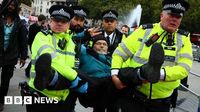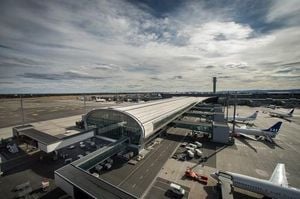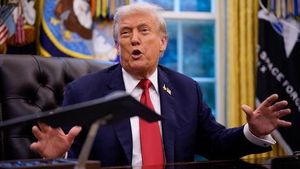Manchester, a city known for its resilience and diversity, is now at the center of a national reckoning. The city’s annual political conference, usually a time of energetic debate and partisan maneuvering, has been overshadowed by grief and fear following a devastating attack at the Heaton Park Synagogue on October 2, 2025. The aftermath of this tragedy has sent shockwaves not only through Manchester, but across the United Kingdom, igniting fierce debates about identity, protest, and the very fabric of British society.
According to BBC News, the emotional weight in Manchester is palpable. Flags outside the conference center fly at half mast, a somber tribute to the victims and a stark reminder of the pain that lingers in the city and beyond. Communities both near and far are mourning, with many Jewish residents expressing deep frustration that more has not been done over the years to ensure their safety. The sense of vulnerability is not confined to Manchester alone; it has reverberated throughout Jewish communities across the UK.
The political response has been swift and, in some quarters, contentious. Home Secretary Shabana Mahmood made a public plea in the days following the attack, urging pro-Palestinian protesters not to take to the streets. She argued that such demonstrations, particularly in the immediate aftermath of the attack, would be "un-British." Mahmood’s words were not merely a call for calm; she announced plans to legislate against repeated protests, a move that has sparked a heated debate over civil liberties and the right to dissent.
As BBC News reported, Mahmood’s stance has drawn both support and criticism. Some argue that curbing protests in times of heightened tension is necessary to maintain order and respect the grieving process. Others, however, question whether restricting protest is itself contrary to the values of a free and open society. The question, as many are now asking, is what it truly means to be British in a nation defined by its multicultural, multilingual, and multireligious makeup.
These debates are not happening in a vacuum. The attack and its aftermath have brought to the surface longstanding concerns about antisemitism and Islamophobia in the UK. The Home Secretary, speaking over the weekend, referred to the need for improved "community relations"—a phrase that, as some critics point out, can sometimes mask deeper issues of racism and hatred. The Conservative leader, Kemi Badenoch, was more direct, stating that the UK had tolerated "radical Islamist ideology for too long." This perspective has struck a chord with some, while angering others who feel it unfairly stigmatizes entire communities.
In the days since the attack, the conversation has broadened from questions of security to fundamental issues of democracy, protest rights, tolerance, and proportionality. As BBC News observed, the current moment is forcing the UK to grapple with the core tenets of its national identity. What does it mean to be tolerant in a society that must also confront intolerance? How should the state balance the right to protest with the need to maintain public order and protect vulnerable groups?
The tension reached another level as protests related to Palestine were scheduled to take place at universities across the country on October 7, 2025. Labour leader Keir Starmer joined the call for restraint, urging students not to participate in what he described as "un-British" protests. This appeal reflects the heightened sensitivity in the wake of the Manchester attack, but it also underscores the ongoing struggle over who gets to define the boundaries of acceptable dissent in British society.
For many Jewish residents, the sense of anger and abandonment is acute. As reported by BBC News, "Many Jewish people are furious more has not been done—for years—to protect them." Their frustration is not only about the recent tragedy but also about a perceived pattern of neglect and insufficient action by authorities. This sentiment has been echoed in community meetings and across social media, with calls for more robust measures to combat antisemitism and ensure the safety of religious minorities.
At the same time, the government’s response has raised concerns among civil liberties advocates and members of other minority communities. The prospect of new legislation to curb repeated protests has alarmed those who see protest as a vital part of British democracy. Critics argue that restricting protests, even in the name of security, risks undermining the very freedoms that define the nation. As some have pointed out, the right to assemble and voice dissent is a cornerstone of British political culture, dating back centuries.
The debate has also exposed divisions within political circles. While some leaders, like Mahmood and Badenoch, have emphasized the need for tougher measures against extremism, others have cautioned against conflating the actions of individuals with entire communities. The challenge, as many commentators have noted, is to find a way forward that addresses legitimate security concerns without fueling further division or alienating minority groups.
Underlying all of this is a broader conversation about what it means to be British in an era of rapid change and heightened anxiety. The UK is, after all, a nation built on diversity—a patchwork of cultures, languages, and faiths. The current crisis has forced a reckoning with the values that bind the country together, from democracy and tolerance to the right to protest and the imperative to protect the vulnerable.
As Manchester mourns and the political world debates, the questions raised by the Heaton Park Synagogue attack remain unresolved. Can a society committed to openness and pluralism also take decisive action against those who threaten its safety? How should Britain respond to the twin scourges of antisemitism and Islamophobia without compromising its foundational principles?
These are not easy questions, and there are no simple answers. What is clear, however, is that the events of October 2025 have forced the UK to confront some of its deepest challenges—and to do so in full view of a nation still reeling from tragedy. The coming weeks and months will test not only the resolve of political leaders but also the resilience and unity of British society itself.
As the flags continue to fly at half mast in Manchester, the debate over Britishness, protest, and community relations is far from over. The choices made now will shape the country’s future for years to come.




